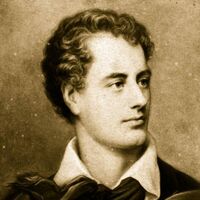To the Duke of Dorset
Dorset! whose early steps with mine have stray’d,
Exploring every path of Ida’s glade;
Whom still affection taught me to defend
And made me less a tyrant than a friend
Though the harsh custom of our youthful band
Bade thee obey, and gave me to command;
Thee, on whose head a few short years will shower
The gift of riches and the pride of power;
E’en now a name illustrious is thine own,
Renown’d in rank, nor far beneath the throne.
Yet, Dorset, let not this seduce thy soul
To shun fair science, or evade control,
Though passive tutors, fearful to dispraise
The titled child, whose future breath may raise,
View ducal errors with indulgent eyes,
And wink at faults they tremble to chastise
When youthful parasites, who bend the knee
To wealth, their golden idol, not to thee,—
And even in simple boyhood ‘s opening dawn
Some slaves are found to flatter and to fawn,—
When these declare, ’ that pomp alone should wait
On one by birth predestined to be great;
That books were only meant for drudging fools,
That gallant spirits scorn the common rules;'
Believe them not;– they point the path to shame,
And seek to blast the honours of thy name.
Turn to the few in Ida’s early throng,
Whose souls disdain not to condemn the wrong;
Or if, amidst the comrades of thy youth,
None dare to raise the sterner voice of truth,
Ask thine own heart; 'twill bid thee, boy, forbear;
For well I know that virtue lingers there.
Yes! I have mark’d thee many a passing day,
But now new scenes invite me far away;
Yes! I have mark’d within that generous mind
A soul, if well matured, to bless mankind.
Ah! though myself by nature haughty, wild,
Whom Indiscretion hail’d her favourite child;
Though every error stamps me for her own,
And dooms my fall, I fain would fall alone;
Though my proud heart no precept now can tame,
I love the virtues which I cannot claim.
‘Tis not enough, with other sons of power
To gleam tile lambent meteor of an hour;
To swell some peerage page in feeble pride,
With long-drawn names that grace no page beside;
Then share with titled crowds the common lot–
In life just gazed at, in the grave forgot;
While nought divides thee from the vulgar dead,
Except the dull cold stone that hides thy head,
The mouldering ’scutcheon, or the herald’s roll,
That well-emblazon’d but neglected scroll,
Where lords, unhonour’d, in the tomb may find
One spot, to leave a worthless name behind.
There sleep, unnoticed as the gloomy vaults
That veil their dust, their follies, and their faults,
A race, with old armorial lists o’erspread,
In records destined never to be read.
Fain would I view thee, with prophetic eyes,
Exalted more among the good and wise,
A glorious and a long career pursue,
As first in rank, the first in talent too:
Spurn every vice, each little meanness shun;
Not Fortune’s minion, but her noblest son.
Turn to the annals of a former day;
Bright are the deeds thine earlier sires play.
One, though a Courtier, lived a man of worth,
And call’d, proud boast! the British drama forth.
Another view, not less renown’d for wit;
Alike for Courts, and camps, or senates fit;
Bold in the field, and favour’d by the Nine;
In every splendid part ordain’d to shine;
Far, far distingish’d ish’d from the glittering throng,
The pride of princes, and the boast of song.
Such were thy fathers; thus preserve their name;
Not heir to titles only, but to fame.
The hour draws nigh, a few brief days will close,
To me, this little scene of joys and woes;
Each knell of Time now warns me to resign
Shades where Hope, Peace, and Friendship all were mine:
Hope, that could vary like the rainbow’s hue,
And gild their pinions as the moments flew;
Peace, that reflection never frown’d away,
By dreams of ill to cloud some future day;
Friendship, whose truth let childhood only tell;
Alas! they love not long, who love so well.
To these adieu! nor let me linger o’er
Scenes hail’d, as exiles hall their native shore,
Receding, slowly through the dark-blue deep,
Beheld by eyes that mourn, yet cannot weep.
Dorset, farewell! I will not ask one part
Of sad remembrance in so young a heart;
The coming morrow from thy youthful mind
Will sweep my name, nor leave a trace behind.
And yet, perhaps, in some maturer year,
Since chance has thrown us in the self same sphere,
Since the same senate, nay, the same debate,
May one day claim our suffrage for the state,
We hence may meet, and pass each other by
With faint regard, or cold and distant eye.
For me, in future, neither friend nor foe,
A stranger to thyself thy weal or woe,
With thee non more saain I hope to trace
The recollection of our early race;
No more, as once, in social hours rejoice,
Or hear, unless in crowds, thy well-known voice:
Still, if the wishes of a heart untaught
To veil those feelings which perchance it ought,
If these– but let me cease the lengthen’d strain,—
Oh! if these wishes arc not breathed in vain,
The guardian seraph who directs thy fate
Will leave thee glorious, as he found thee great.
Other works by Lord Byron...
To a Lady, Who Presented to the Author a Lock of Hair Braided With His Own, and Appointed a Night in December to Meet Him in the Garden
These locks, which fondly thus ent… In firmer chains our hearts confin… Than all th’ unmeaning protestatio… Which swell with nonsense love ora… Our love is fix’d, I think we’ve…

